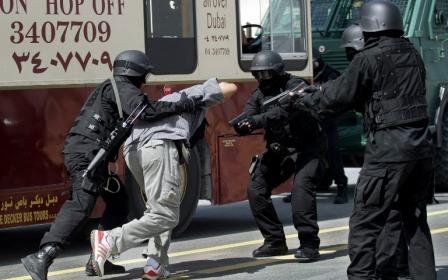Alwaght- Last week, the UAE announced a plan to establish an independent national human rights institute.
The institute will open an office in Abu Dhabi and will seek to "promote and protect the human rights and freedoms in accordance with the national and international laws and instructions," claimed Emirati resources.
UAE's black record in the human rights reports
Although the Emirati government made official announcement, many observers question the honesty of the Abu Dhabi claims.
Hiba Zayadin, a Human Rights Watch (HRW) researcher with focus on the Arab world, commented on the Emirati plan, saying this is just a "tactic" and part of the UAE's 10-year campaign to introduce itself as a country free and interested in human rights.
"But the situation on the ground is very different," she told DW. "In fact, there is absolutely no room for dissent in the UAE. There have been no independent civil society groups there since 2012 and so many people have been jailed. There is a lot of fear of retaliation for speaking out and a high level of censorship, even amongst UAE-based international journalists and academics," she was quoted as saying.
But she is not the only expert criticizing the state of human rights in the Arab monarchy; other experts and human rights organizations have similar conclusions.
The rights advocacy NGO Freedom House, which examines the rights status and democracy in countries, in a 2020 report labeled the UAE an unfree country. The report adds that the UAE is among Arab world countries with most restrictive journalism laws. Moreover, the Emirati activists are in constant danger of detention, prosecution, and abuses in detention.
Tight cyber restrictions in the UAE
The Reporters Without Borders in a report focused on the UAE since 2012 suggests that the country ranks 130 out of total 180 countries in terms of freedom of media.
The Amnesty International in a long list revealed names of the "prisoners of conscience" in the UAE, including name of Ahmad Mansour, the prominent rights activist. He was sentenced to 10 years in prison for social media posts bringing in spotlight human rights abuses in the Persian Gulf Arab monarchy.
A couple of months ago, the UN Special Rapporteur asked the UAE to release people imprisoned for criticizing the government and rulers. Abu Dhabi has not responded affirmatively yet.
"Joke of the season"
Social media users have reacted to the UAE's opening of a human rights office, calling the claim a "big joke". A Twitter user posted: "The UAE and human rights are not really compatible."
Fahad al-Ghafili, a human rights activist, in a Twitter post called the plan "Joke of the season."
How serious is UAE?
Despite the UAE's claim, this does not seem to be taken seriously in practice.
In other words, the founder of the rights organizations needs to be clear so that the reports and performance be adapted by the International rights advocacy institutions.
With the rights institute funded by the government, can it act independently in addressing the human rights abuses in the country? The answer to this question is absolutely no, given the black record of Abu Dhabi in crackdowns on the critics.
At best, the human rights council in the UAE will not perform better than the similar ones in countries with notorious records like Saudi Arabia and Bahrain, both of which founded their rights councils years before the UAE. With these councils reliant financially on abusive governments, they mainly serve pretentious and promotional goals.
As a conclusion, with a black record of human rights, the UAE's rights office plan seems to be an attempt to reduce the foreign pressures and criticism Abu Dhabi is subject to, and thus will not serve genuine rights agenda in practice.



























